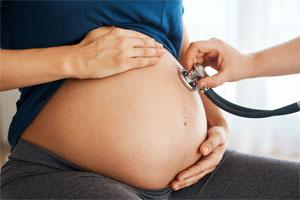Topics
The rhythm of a healthy heart requires careful coordination to properly pump blood throughout the body. This rhythm is controlled by electrical impulses that allow for synchronized filling and emptying of the heart’s four chambers.
Many conditions may cause the electrical impulses that control the heart to be irregular, too fast (tachycardia) or too slow (bradycardia).
Fetal cardiac arrhythmia, or irregular heartbeat, is a common reason for referral to a fetal cardiologist. In most cases, a heartbeat that is too slow or too fast is temporary. In these cases, your team will monitor your pregnancy closely.
Less than 2 percent of fetal heartbeat irregularities represent true cardiac arrhythmias. However, if cardiac arrhythmia is not diagnosed or left untreated, it can lead to serious problems for the baby, including congestive heart failure.
By 16 weeks of pregnancy, the fetus’ heart is completely formed and beats at a rate of 110 to 160 beats per minute (bpm).
Mild cases of arrhythmia were once thought to be benign but doctors now recognize that any irregular heartbeat should be identified and monitored closely to ensure the best outcome for the baby.
Fetal cardiac arrhythmias are most often classified as one of the following:
- Bradycardia - Heart rate below 100 bpm
- Congenital heart block
- Premature atrial contractions (PAC)
- Supraventricular tachycardia or atrial flutter – Heart rate above 180 bpm
Rarely, a different rhythm abnormality is present, which we will work to diagnose and treat
Symptoms and Causes
The condition often is first noticed when the doctor listens to the fetal heartbeat at around 10 to 12 weeks of pregnancy. However, the rhythm abnormality may not start until later in pregnancy. Generally, the mother has no symptoms and notices no change in fetal movement.
The cause of most arrhythmias is unknown but some cases may result from an electrolyte imbalance, inflammation, medication or an inherited genetic condition. Severe cases of arrhythmia may be caused by a heart defect such as congenital heart block or by an inherited condition known as long QT syndrome.
Testing and Diagnosis
If an arrhythmia is suspected, further tests, including a fetal echocardiogram, will be ordered. This test will help your fetal cardiologist diagnose if your baby’s arrhythmia is caused by a problem with the structure of the heart.
Treatment
All forms of fetal arrhythmias are evaluated and managed in conjunction with pediatric electrophysiologists and maternal fetal medicine specialists.
Families who come to Texas Children’s Fetal Center to treat their baby’s arrhythmia are first assigned a nurse coordinator, who helps schedule the many appointments needed and serves as a resource for questions. This nurse coordinator is available 24/7 to answer any of your questions, help you access doctors and other specialists at any time, and generally guide you through this complex and emotional time.
The Fetal Heart Program at Children's Hospital can monitor both baby and mother throughout the pregnancy and create a plan for labor and care after the birth.
While some abnormal fetal rhythm problems are benign, others may result in fetal heart failure and can pose a risk to the fetus and mother. We offer a variety of therapies that are customized for both the fetus and mother. We collaborate closely with adult cardiologists to protect the safety of both fetus and mother during treatment.
If your baby is diagnosed with fetal cardiac arrhythmia, your pregnancy will be monitored closely to watch for hydrops, a serious condition that sometimes develops in more severe forms of fetal cardiac arrhythmia.
Treatment varies according to severity and type of arrhythmia. Some types of fetal arrhythmia can be treated in-utero using certain medications for the mother. In other cases, close monitoring is the best option. This may mean returning to the hospital for echocardiograms frequently until your baby is born.
You should plan to deliver your baby in a hospital with an advanced NICU and specialists who can be on hand at birth should heart surgery be needed.
The recommended treatment for your baby will depend on the type of heart problem present and its severity. However, the earlier a problem is identified, the better you and your physicians can prepare to give your baby the best outcome possible.
Learn more about Texas Children’s Heart Center’s volumes and outcomes data. Our Heart Center is #1 in the nation according to U.S. News & World Report, making our Fetal Cardiology Program the place to be if your unborn child has a heart issue such as arrhythmia.
Research and Clinical Trials
The Fetal Cardiology team, which is a collaboration between the Texas Children’s Heart Center and Texas Children’s Fetal Center, constantly strives to investigate novel fetal therapies for improving heart issues in fetuses.
Fetal atrial flutter & supraventricular tachycardia (FAST) therapy trial
We are part of an international study evaluating the best treatments for fetal supraventricular tachycardia and atrial flutter.
- Principal Investigators: Dr. Nancy Ayres and Dr. Shaine Morris
- To be evaluated for eligibility or for questions, contact the Fetal Center at 832-822-2229.
Volumes and Outcomes
In the News

Videos
- Critical congenital heart disease screening now required for all newborns in Texas
- Congenital heart surgery - Services at Texas Children's Heart Center
- Echocardiogram: Texas Children’s Heart Center animation series
Learning Website
Examples of fetal echocardiograms demonstrating fetal arrhythmias from the TCH Pediatric Echocardiography Learning Website:
For more information or to schedule an appointment,
call Texas Children’s Fetal Center at 832-822-2229 or 1-877-FetalRx (338-2579) toll-free.
Our phones are answered 24/7. Immediate appointments are often available.
